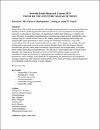Research Title: Effect of Hydrophobic Coating on Solar PV Panels

View/
Date
2025Author
Al-Thani, Alshayma N.Ibrahim, Khaloud Abdulla
Sebouai, Ahmed
Alshaabi, Sara
Abdallah, Bader
Asif, Anamta
Thomas, Kevin
Rahman, Ahasanur
Khandakar, Amith
Ayari, Mohammed Arsalan
...show more authors ...show less authors
Metadata
Show full item recordAbstract
Photovoltaic (PV) panels are essential for sustainable energy generation, converting sunlight into electricity without producing harmful emissions. However, dust accumulation on PV panels, especially in arid regions like Qatar, can significantly reduce their efficiency. To address this issue, this study investigates the application of a professional-grade ceramic hydrophobic nano-coating (Drexler Ceramic Glass Coat), on PV panels, aimed at mitigating dust buildup and enhancing PV panel performance under varying environmental conditions. Using a PV monitoring system, the study compared the power output of two panels, one coated with nano-coating and an uncoated control over the summer months (June, July, and August). Results demonstrated that the coated panel consistently outperformed the uncoated panel, with peak power output during high sunlight periods. The efficiency varied slightly due to factors such as humidity and temperature fluctuations, however, the hydrophobic coating consistently contributed to better performance by reducing dust accumulations and enhancing power generations. These findings were significant in highlighting the potential use of hydrophobic coating in improving both efficiency and durability of PV panels, providing a practical approach for sustainable renewable energy in dusty climates.
DOI/handle
http://hdl.handle.net/10576/62493Collections
- The Scientific Research Theme [80 items ]

